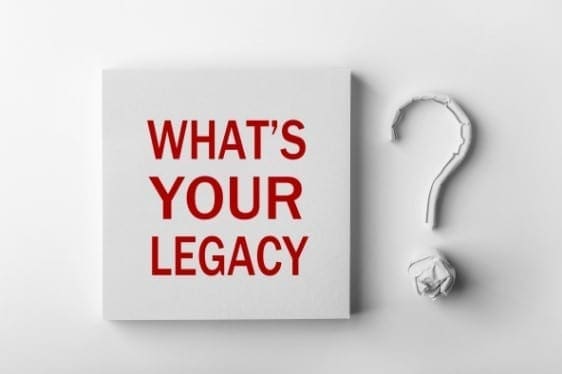 An Ethical Will is the story of your life. All the personal knowledge, lessons, and tips you could pass on to your loved ones.
An Ethical Will is the story of your life. All the personal knowledge, lessons, and tips you could pass on to your loved ones.
Unlike a traditional will, which focuses more on significant assets and money. The intention of an ethical will is to communicate love and learning to future generations.
The content of an ethical will can include family history, cultural and spiritual values, hopes and dreams for children and grandchildren, life lessons and experiences, apologies, explanations for financial decisions, stories about meaningful objects for heirs to receive, and the reason they received them, clarification about advance healthcare directives, and requests for ways to be remembered after death.
Ethical Will Origin
The ethical will is an ancient document from the Jewish tradition that passes ethical values from one generation to the next. Medieval ethical wills contained the directions of fathers to their children or of aged teachers to their disciples.
They were often written calmly in old age and were intended for the private use of children, relatives, or beloved pupils who held a special place in his teacher’s regard. Because these private letters were not meant for publication, they often contained the writer’s innermost thoughts and feelings.
Reasons To Write An Ethical Will
Aside from the original intention of passing down values and traditions through generations, writing an ethical will can also benefit you during your own life. By writing down what you value most in life, reflecting on your personal experiences, and thinking about the decisions you’ve made. You can learn more about yourself and go on a journey of self-reflection, and perhaps even self-improvement.
According to celebrity doctor of alternative medicine, Andrew Weil, the ethical will is a gift of spiritual health. To link a person to both their family and cultural history, clarify their spiritual and ethical values, and communicate a legacy to future generations – it addresses people’s “universal needs”.
“Writing an ethical will addresses a person’s needs to belong, be known, be remembered, have one’s life make a difference, bless and be blessed.”
Ethical Wills can also be used to distribute personal property that has more of an emotional value than a financial one. Items like family photographs, special articles of clothing, and handed-down recipes. More so, an ethical will can be used to explain the decisions you made in your legal will, in case there might be some confusion.
When and How To Start Writing Your Ethical Will
There is no right or wrong time to start compiling your “memoir”. However, writing things down as you are going through them or when you think of them would prove to be much easier. Rather than sitting down one day in your old age, trying to remember everything that ever happened to you and your takeaways from those situations.
The best time to start writing is probably when you are young, growing your family, and putting together your estate plan. It’s a good time to think about what you wish for your children in the future.
continue writing throughout your life then compare all your thoughts when you are older. What memories and experiences do you want to share with your family? What lessons have you learned? It can be an ongoing journal so you don’t have to write the whole thing in one sitting.
You can start your ethical will by telling stories that were passed down to you, Then think back to the most significant events, moments, and experiences in your life. Your happiest memories and your most challenging moments.
There is no standard structure to an ethical will, so feel free to make it personal. It could be an informal letter, diary, or a collection of pictures, videos, or poems. It could be anything you want it to be. Anything that speaks to you.
 Tips To Make Sure Your Legacy Lives On After You’re Gone
Tips To Make Sure Your Legacy Lives On After You’re Gone
You are the original source of your life and the legacy your predecessors left behind. If you don’t share it, who will? It can be difficult to organize your thoughts sometimes so let’s go one small step at a time.
About Me
Share your thoughts, experiences, special stories, or anything else you want other people to know about you. You can also include pictures of yourself through the years enjoying your favorite activities. Talk about your favorite things like books, movies, or recipes.
Important things you learned from your parents or siblings, your best and worst job, and why you chose your profession, the happiest and most difficult times in your life. The list could be endless. It’s not a legal document like a Will or POA. Legacy letters are a personal and at times even fun, activity to get this information on the record so it’s not lost to time forever.
Possessions & Keepsakes
Do you have any special items that may have a story behind them or that are special to you for other reasons? This is where you get the chance to tell those specific stories. You could also explain why certain people inherited certain items in your will.
You can also include family recipes if there are any. Try to be as detailed as possible regarding ingredients and instructions, the original cook, and even memories you may have of eating or making specific dishes.
Genealogy & Family History
Keep your family tree up to date for future generations by sharing details and stories about deceased family members. Include your relation to the person and any other information you may know like their name, birthday, your favorite memories with them, etc. Also, Including old or antique photos of relatives known or unknown could be a great way to help your family reconnect to their roots.
Write Legacy Letters To Your Family & Friends
You can write letters to your kids, grandkids, best friends, and people who made the biggest impact in your life – start out by making a list of who you want to write to. it helps to start getting organized. There are a lot of people in your life, and each person might require a different message to help ease the grief after you’re gone. Let the relationship you had with that person be your guide to how and what you want to write.
The letter doesn’t have to be a story. It could be a list of lessons you learned that stuck with you through life. It could be a song that always made you happy or sad, a photo that gave you strength, a famous quote that provided inspiration, or a mantra that you’d always repeat. When you’re expressing genuine emotion, there are no rules. Loosen up and make it so the person reading it can hear and feel your voice in their head.
President Barack Obama’s legacy letter to his daughters
Record Legacy Videos
Over the past year, many of us have been forced to become more familiar with using video. Especially to stay in touch with co-workers, friends, and family. This newfound skill may have prepared you for leaving behind videos for loved ones instead of letters.
This is where you don’t have to try hard to be yourself. Just talk to the camera and don’t worry about what comes out. But just like letters, you may do as many takes as you want. Just don’t forget to do a blooper real – those are the best parts after all.
 Memorialization
Memorialization
Not only can you write down memories, but you can also create them. To make sure you are truly remembered for who you were in life, you can create a tradition in your name that could actually bring your loved ones together.
If you were really into nature, you can have a tree or a garden planted in your name. Did you love to ride your bike? how about an annual bike-a-Thon? Game night with your favorite board games, or have the family get together for a trip to the stadium to watch your favorite team play. You can choose the way people remember you.
Keep Your Ethical Will Up To Date
Just like any of your other important legal documents – it’s important to keep your ethical will current. Your past may have not changed but the things you want to say to certain people could have. So peak inside your manifesto once in a while, especially when something monumental happens in your life.
Tell Someone About It
You probably don’t want to share your ethical will with anyone while you’re still alive. So you want to make sure it’s kept in a secure place. The best way to stay organized is by keeping it with your other legal documents. Like in your filing cabinet or safe. Just don’t forget to leave instructions with a person you trust so it gets into the right hands.
Disclaimer: The information provided in this article does not, and is not intended to, constitute legal advice and is for general informational purposes only.
Let Us Know How We Can Help!
Please fill in your contact information and a brief message about what you need help with. A consultation will need to be scheduled in order to provide legal guidance.
Marketing & Technology Director at RWC, LLC, Attorneys & Counselors at Law
Ukraine born and Israel / Miami, FL raised. University of Miami graduate in the Marketing field.
Mom to a girl, a boy, and a Siberian Husky.







